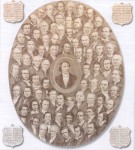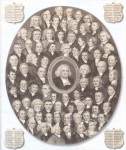Yesterday's OWW service was a somewhat odd experience.
The congregation was mostly Baptists (my lot and D+1 who were sharing our worship this time) a fair smattering of Methodists (who were hosting and leading) and exactly 4 Anglicans (all taking part in the service).
The service itself felt clumsy, although based on supplied material, with some overlong pauses and miscommunications along the way. The ending was very ragged with no one sure it was over. Once it had ended, the Bappies all started chatting to each other, and continued so to do until the hosts switched off the lights! Many of my folk commented on the lack of a cup of tea after the service, and I smiled inwardly recalling the uphill struggles to get them to do tea in the first palce!!
A couple of people made it quite clear they did not agree with what was being shared. One said he was not convinced that there was an environmental time bomb waiting to happen - if there was surely the gvernment would do more about it. Another delcined to take a 'carbon footprint' questionaire, delcaring 'charity begins at home, this church is far too hot, turn your heating off.' Whilst I agreed with him, it was far too hot, I have regualrly had my skull roasted when visiting his.
The commissioned hymn was sung - and it felt all rather odd. Heavy on complex language and not quite fitting the stresses of the tune (Sine Nomine). Prize for the most obtuse line must go to "whose depradation despoils creation" - I had to get a dictionary out to be sure I'd understood that.
The sermon certainly made some people think, judging by their expressions, and one retired Methodist minister said it was 'a good message' - something he wouldn't say if he didn't think so.
I am still pondering what all of this care for the planet means for us with our Victorian barns of buildings and decrepit manses, all heated inefficiently, lacking insulation and double glazing, burning lots of gas and using loads of electricity all for a couple of hours a week. I am trying to guess how the hymnbooks/hymnsheets vs technology debate works out from a conservation perspective (as these things are never as trivial as they seem) and whether some form of practical ecumenism withshared buildings and resources might not be sign of the kingdom. Hmm. Lots to think about.


